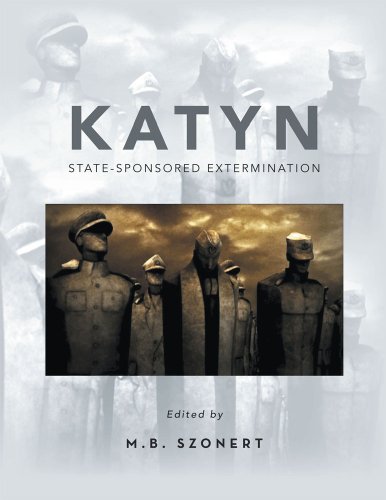Katyn Was Genocide Szonert

Katyn: State-Sponsored Extermination, by Maria Szonert. 2012
Katyn, According to National Law, Definitely Qualifies as Genocide
There are many books on the Katyn massacre. [See the Peczkis Listmania: THE KATYN MASSACRE…] This one stands out, providing an up-to-date account of Katyn and its understanding on the international scene. It also shows, in striking fashion, how much effort the Roosevelt Administration exerted in order to suppress the truth about Katyn.
LEGACY OF KATYN
Editor Maria Szonert Binienda (p. 5) introduces the reader to the significance of the Katyn massacre by quoting Benjamin B. Fisher of the CIA (Central Intelligence Agency), who said that, “The Katyn Forest massacre was a criminal act of historic proportions and enduring political implications.”
Dr. Mark Kramer of Harvard University, a descendant of Latvian Jews murdered by the NKVD, summarizes, for the reader, the course of murderous Soviet Communist policies. Katyn stands out. Although the Soviets had gradually murdered millions of people up to 1940, Katyn was one of the few times that they systematically murdered many thousands of people at one specific time. (p. 8).
World War II had begun when Nazi Germany and the USSR agreed to jointly conquer Poland. Karol Karski, a Professor of International Law at the University of Warsaw, shows how the Soviet invasion of eastern Poland, in partnership with Nazi Germany relative to western Poland, had flagrantly violated international law. This act of Soviet aggression violated the Soviet-Polish nonaggression pact (1932; extended through 1945), several provisions of the League of Nations restricting JUS AD BELLUM (“right to war”), the London Convention (1933), the Briand-Kellogg Pact (1928), and the Litvinov Protocol (1929). (p. 31).
KATYN, NOT “JUST” A MASSACRE: A CRIME AGAINST HUMANITY
In addition, Karol Karski puts Katyn in the context of international law, as he writes (quote) It shall be noted, however, that the Katyn crime has all the characteristics of a crime against humanity in that it was directed in part against a civilian population. The Nuremberg Principle VI (c) includes under this heading “murder, extermination, enslavement, deportation, and other inhumane acts committed against any civilian population…” It should be added in this context that the terms GENOCIDE, WAR CRIME and CRIME AGAINST HUMANITY also applied to the four waves of deportations of Polish citizens to Siberia and Central Asia between 1940 and 1941…These deportations had the characteristics of ethnic cleansings and were carried out in such a way as to disintegrate ethnic ties. (unquote)(p. 31).
Judge Aurelia Pucinski discusses the work of her late father, Roman Pucinski, including the 1952 United States Congressional Investigation. [For details on the 1952 investigation, read, the Peczkis review of: The Katyn Forest Massacre, Hearings before the Select Committee…, Part 3 (Chicago, IL.)]. She also provides a fine history of the earlier stalling acts of American and British officials.
Witold Wasilewski elaborates on information that the Russians have released, and that which they had either destroyed or withheld. For instance, while the general outlines of the Katyn massacre are known, the specifics are not. Most of the places where Poles were murdered by the Soviets remain known vaguely, if at all.
KATYN: AN EXTENTION OF THE GENOCIDE OF SOVIET POLES IN THE GREAT TERROR
Karol Karski points out the fact that the genocidal crime at Katyn was a continuation of the so-called Polish operation of 1937-1938, during which 85,000 Soviet Poles had been murdered for no other reason than the fact that they were Poles. (p. 23, 30). He adds that the crime at Katyn falls under the 1948 Convention on the Prevention and Punishment of the Crime of Genocide. (p. 32). Interestingly, the fact that Katyn was a form of genocide, and therefore had no statute of limitations, was recognized, in 1994, by Soviet prosecutors such as Boris Topornin and Aleksandr Yakovlev. The Russian government then muzzled the prosecutors. (p. 32). Ironically, during the Nuremberg Trials themselves, none other than the Soviet Union ITSELF had recognized Katyn as a form of genocide–when it was falsely trying to blame it on the Germans! (p. 30). Maria Szonert Binienda aptly assesses the legacy of the crime of Katyn, as she comments, “Poland would be a very different country today if the Soviets, in collaboration with the Germans, had not deprived the nation of its most enlightened citizens. The extermination of the pillars of Polish society resulted in the next generations being raised and taught by Communist collaborators and opportunists who continue to suppress the truth about Katyn. That is why no National Katyn Memorial has been built in Poland yet.” (p. 58).
To see a series of truncated reviews in a Category click on that Category:
- All reviews
- Anti-Christian Tendencies
- Anti-Polish Trends
- Censorship on Poles and Jews
- Communization of Poland
- Cultural Marxism
- German Guilt Dilution
- Holocaust Industry
- Interwar Polish-Jewish Relations
- Jewish Collaboration
- Jewish Economic Dominance
- Jews Antagonize Poland
- Jews Not Faultless
- Jews' Holocaust Dominates
- Jews' Holocaust Non-Special
- Nazi Crimes and Communist Crimes Were Equal
- Opinion-Forming Anti-Polonism
- Pogrom Mongering
- Poland in World War II
- Polish Jew-Rescue Ingratitude
- Polish Nationalism
- Polish Non-Complicity
- Polish-Ukrainian Relations
- Polokaust
- Premodern Poland
- Recent Polish-Jewish Relations
- The Decadent West
- The Jew as Other
- Understanding Nazi Germany
- Why Jews a "Problem"
- Zydokomuna